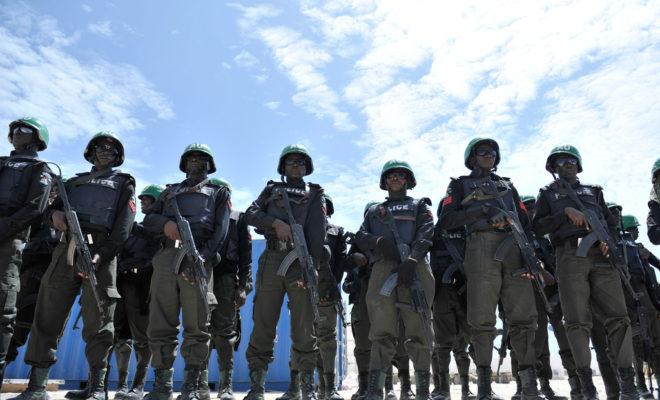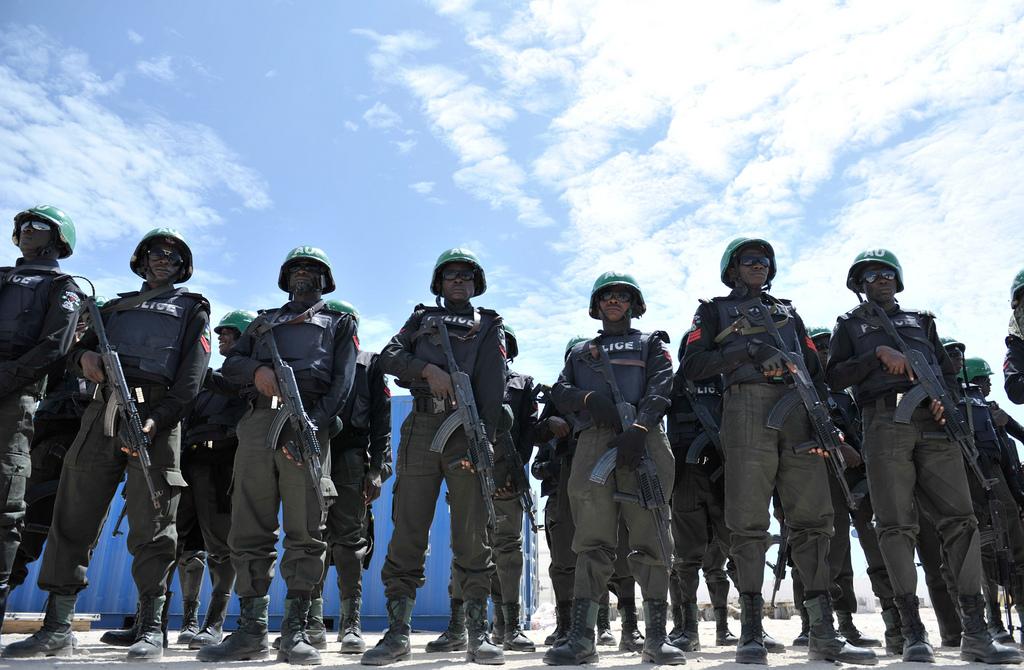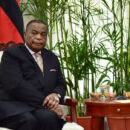#EndSARS: Why a few reforms won’t fix the world’s worst police force

Nigerians are calling for Special Anti-Robbery Squad, a notoriously brutal police unit, to be disbanded. With good reason.

Nigerian police officers, on rotation as part of the AU police force in Somalia. Credit: AU UN IST/David Mutua.
Recently ranked as the worst in the world, Nigeria’s police have a history of using torture and brutality, alongside a reputation for corruption and inefficiency. And Nigerians have had enough.
This week, the hashtag campaign #EndSARS went viral as people called for the Special Anti-Robbery Squad − a particularly brutal police unit − to be disbanded. Social media users shared their encounters with SARS and called on the government to address their human rights abuses.
In response, the Inspector General of Police Ibrahim Idris announced a total reorganisation of the Squad and an investigation into the allegations. But will this make any difference?
Extensive torture
Since the Nigeria Police Force’s (NPF) inception, numerous national organisations − such as CLEEN, NOPRIN, Stop the Bribes and Access to Justice – alongside international ones − such as Human Rights Watch and Amnesty International − have reported on its acts of torture, ill-treatment and brutality.
In 2007, Manfred Nowak, the UN Special Rapporteur on torture and other cruel, inhuman or degrading treatment or punishment, visited Nigeria. He concluded that torture and ill-treatment was widespread in police custody, particularly in the Criminal Investigation Departments (CID) where it was a challenge to find any detainee that had not been a victim.
Methods of torture included beatings, being shot in the foot, mock executions, suspension from the ceiling or metal rods, and denial of medical treatment. The latter had resulted in deaths, essentially amounting to extrajudicial killing. Nowak also noted the lack of effective complaint mechanisms and a culture of impunity.
The Network on Police Reform in Nigeria’s (NOPRIN) 2010 report saw no improvement. It found that hundreds are murdered each year by the NPF, predominantly by the SARS and CID. Families are simply told that the victim has been transferred to another station, or officers fabricate a story about an attempted escape to justify excessive force. NOPRIN also documented evidence of severe beatings, suspension from rods, burning, waterboarding, stress positions, rape and pepper spray used on genitals.
An Amnesty International report based on over 500 interviews from 2007-2014 made similar conclusions. They found extensive torture by both the NPF and Nigerian military, with the aforementioned tactics alongside electric shock, nail and tooth extraction, and rape. Women and children were not immune to these abuses. In 2016, Amnesty released another report, this time focusing on SARS. They found that torture was frequently used to extract information and confessions, which were then used as a basis for convictions in court. Some detainees were also extorted; for example, 24-year-old university student Ekene was told that his mother had to pay a N100,000 ($280) bribe or “his life would not be guaranteed”.
Entrenched abuses
Torture and police brutality has become so commonplace in Nigeria that a new lingo has been created to describe it. An O/C (officer in charge of) Torture exists in every major police station. Torture rooms are referred to as “theatres” or “temples”. The SARS detention facility in Abuja is known as “The Abattoir”. The Sector Alpha Military facility in Damaturu is known as “Guantanamo”.
Different types of torture have names like “J5” (sleep deprivation from prolonged standing), “suicide” (being tied upside down by the ankles) and “third degree” (being tied with ankles and wrists folded behind the back and hung from a rod).
Official comments further entrench these abuses. A military representative told Amnesty in 2013 that torture and ill-treatment was necessary in the context of fighting Boko Haram. In 2008, the head of SARS Enugu boasted about ordering extrajudicial killings. Police officers told NOPRIN that they commit extrajudicial killings as they do not want suspected armed robbers to be released on bail.
Nigeria’s police officers do befall numerous problems in their line of work. Both colonialism and events since independence – periods of military rule, coups and civil war – have cemented a culture of police brutality. Additionally, in a country of diverse languages, cultures and terrain, a centralised police force faces many difficulties.
Moreover, police resources and salaries are poor. With a lack of effective investigative resources, officers may resort to torture to obtain results. Poor pay leads many to turn to corruption, soliciting bribes to get by. In addition to extorting detainees, the NPF and particularly SARS are known to arbitrarily arrest those with fancy laptops, phones or cars to extract money.
A major problem in tackling these abuses is that police officers are rarely held to account. Many people told Amnesty that they did not report torture and ill-treatment due to fear of reprisal. Most cases that are reported are not investigated, with oversight bodies simply making recommendations and referring investigations back to the police. In terms of discipline, officers are seldom punished but simply transferred. Rarely are victims compensated.
Why reform isn’t enough
On paper, torture and police brutality has no place in Nigeria. The constitution prohibits it, while the country has ratified relevant UN conventions and is party to various international charters that outlaw torture and ill-treatment.
Nigeria has also previously launched a National Committee against Torture to investigate complaints. In 2014, a NPF manual to prevent torture and ill-treatment was released. Then in 2015, SARS was reorganised into two units to combat abuses, and the Public Complaint Rapid Response Unit was introduced. The 2015 Administration of Criminal Justice Act further addressed some aspects of ill-treatment, although it has yet to come into effect in all states.
Despite these measures, however, brutality continues to reign. Attempts to introduce a specific anti-torture bill, undertaken periodically since 2012, have been unsuccessful. In the first half of 2017, the Public Complaint Rapid Response Unit received 1,115 complaints. Yet according to the Unit, no SARS officers are currently being investigated. With a mandate to only make recommendations and refer investigations back to the police, the Unit has made little difference.
The Inspector General of Police’s promises following the #EndSARS media campaign are also unlikely to make much difference. He vowed to reorganise the SARS and mandated the X-Squad – located in the CID – to investigate allegations.
But further restructuring is not the answer, and expecting the CID to hold other police accountable is an abysmal response. The culture of torture and brutality within the whole NPF needs to be addressed, alongside issues of corruption and poor resources. Ending impunity in the police system will require an independent oversight system with a mandate to properly investigate and prosecute allegations.
When it comes to the notoriously brutal SARS unit, reform may not achieve substantial change. As countless Nigerians are demanding through the hashtag, the only solution may be to #EndSARS.




